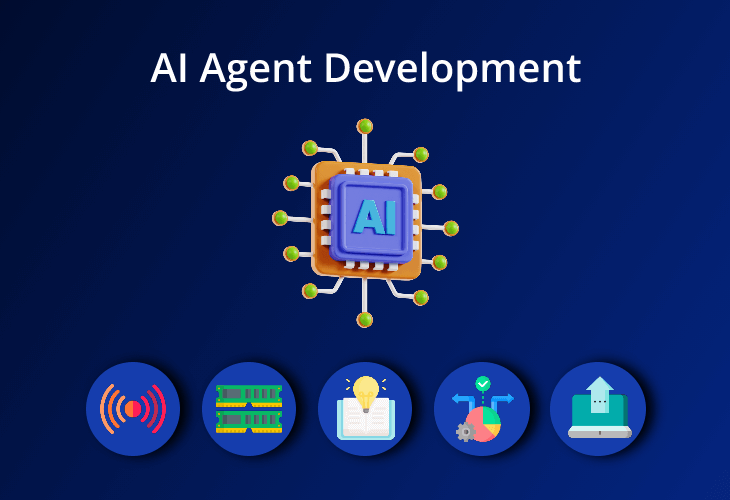How AI Agent Development Revolutionizes Industries?
The integration of artificial intelligence (AI) into various industries has marked a significant turning point in how businesses operate. Among AI’s numerous applications, AI agent development stands out for its ability to automate processes, enhance decision-making, and improve customer experiences. AI agents autonomous software entities capable of learning and adapting are revolutionizing industries by offering innovative solutions to complex challenges. In this blog, we’ll explore how AI agent development is transforming industries, the underlying technology, and the real-world applications of these intelligent systems.
What is AI Agent Development?
AI agent development refers to the process of creating intelligent, autonomous systems that can perform specific tasks or make decisions without direct human intervention. These agents are designed using machine learning (ML), natural language processing (NLP), and other AI technologies to understand data, interact with humans, and adapt to new situations. AI agents can range from virtual assistants like chatbots to complex systems managing industrial automation or customer service.
Core Technologies in AI Agent Development
- Machine Learning (ML): Enables agents to learn from data and improve their performance over time.
- Natural Language Processing (NLP): Facilitates human-like communication for better interaction with users.
- Computer Vision: Allows agents to interpret and process visual data.
- Reinforcement Learning: Helps agents make sequential decisions to achieve long-term goals.
- Cloud Computing: Provides scalable resources for data storage and processing.
How AI Agents Are Revolutionizing Industries
1. Customer Service and Support
AI agents, such as chatbots and virtual assistants, are transforming customer service by delivering instant, 24/7 support. They handle inquiries, resolve issues, and personalize interactions, leading to improved customer satisfaction. For example, companies like Amazon and Google leverage AI agents to enhance customer support with minimal human intervention.
2. Healthcare
In healthcare, AI agents play a critical role in diagnostics, patient engagement, and operational efficiency. Virtual health assistants can schedule appointments, provide medication reminders, and answer patients’ queries. More advanced AI agents analyze medical images or patient records to assist doctors in diagnosing diseases and recommending treatments.
3. Finance
The finance industry benefits from AI agents in areas such as fraud detection, risk management, and personalized financial advice. For instance, robo-advisors use AI to offer investment advice based on market trends and individual goals, while fraud detection systems monitor transactions to identify anomalies in real time.
4. Retail and E-commerce
AI agents enhance retail and e-commerce experiences by personalizing product recommendations, optimizing inventory management, and improving customer engagement. Chatbots on websites assist shoppers with queries, while AI-driven supply chain agents ensure timely delivery by predicting demand and logistics challenges.
5. Manufacturing
In manufacturing, AI agents optimize production lines by monitoring equipment, predicting maintenance needs, and automating quality control processes. Autonomous systems improve productivity, reduce downtime, and enable predictive maintenance, saving costs and ensuring efficiency.
6. Education
AI agents are transforming education through personalized learning experiences. Virtual tutors analyze students’ progress and adapt teaching methods to their needs. Additionally, administrative AI agents automate routine tasks like scheduling and grading, allowing educators to focus on teaching.
7. Logistics and Transportation
Logistics companies use AI agents for route optimization, real-time tracking, and predictive analysis. For example, autonomous vehicles rely on AI agents to make split-second decisions, improving road safety and efficiency.
8. Human Resources (HR)
HR departments leverage AI agents to streamline recruitment, onboarding, and employee engagement. AI-powered systems can screen resumes, schedule interviews, and provide personalized training recommendations, enhancing workforce management.
Key Benefits of AI Agent Development
- Increased Efficiency: Automates repetitive tasks, allowing employees to focus on high-value activities.
- Cost Reduction: Minimizes the need for extensive manpower and reduces operational costs.
- Scalability: Handles large volumes of tasks or interactions, making it easier to scale operations.
- Personalization: Offers tailored experiences to customers and employees.
- Improved Accuracy: Reduces human errors in decision-making and data processing.
- Real-Time Insights: Analyzes data in real time, providing actionable insights for strategic decisions.
Challenges in AI Agent Development
Despite its potential, developing AI agents comes with challenges:
- Data Privacy and Security: Handling sensitive data responsibly is critical to avoid breaches.
- Bias in Algorithms: Ensuring AI agents make fair and unbiased decisions requires careful design and testing.
- Integration Complexity: Integrating AI agents into existing systems may require significant resources.
- Cost of Development: Developing advanced AI agents can be expensive, especially for small businesses.
- Continuous Learning Needs: AI agents need constant updates and training to remain effective.
Real-World Applications of AI Agents
- Tesla: AI agents power Tesla’s self-driving cars, enabling them to make decisions on the road.
- Netflix: Personalized recommendations are driven by AI agents analyzing user behavior.
- Salesforce: AI agents in Salesforce automate customer relationship management, improving sales efficiency.
- IBM Watson Health: AI agents assist in analyzing medical data to support clinical decisions.
The Future of AI Agent Development
The future of AI agent development looks promising, with advancements in AI technologies further enhancing their capabilities. Key trends include:
- Multi-Modal AI Agents: Capable of understanding and processing multiple types of inputs like text, voice, and images.
- Edge AI: AI agents operating on edge devices for faster and more localized decision-making.
- Ethical AI: Ensuring agents follow ethical guidelines in decision-making processes.
- Industry-Specific AI Agents: Tailored solutions for niche industries such as agriculture and energy.
Conclusion
AI agent development is a transformative force across industries, offering innovative solutions that improve efficiency, enhance decision-making, and redefine customer experiences. By leveraging technologies like ML, NLP, and computer vision, AI agents are enabling businesses to stay competitive in a fast-paced digital landscape. While challenges exist, the potential benefits far outweigh the hurdles, making AI agents an essential component of the future. Embracing AI agent development today ensures a smarter, more automated tomorrow.













Post Comment